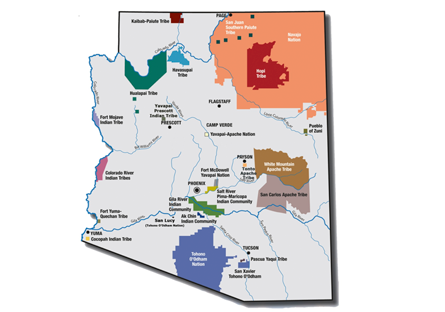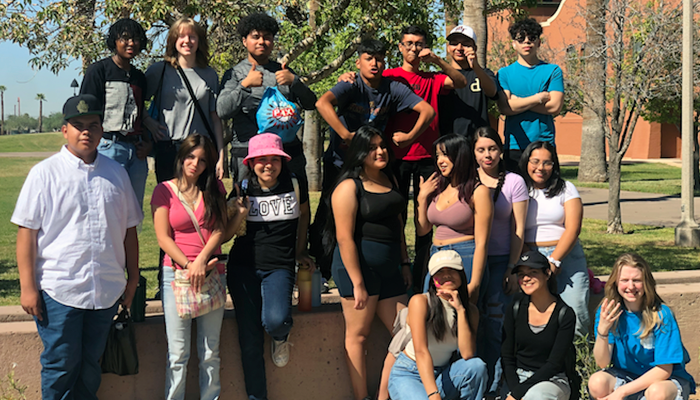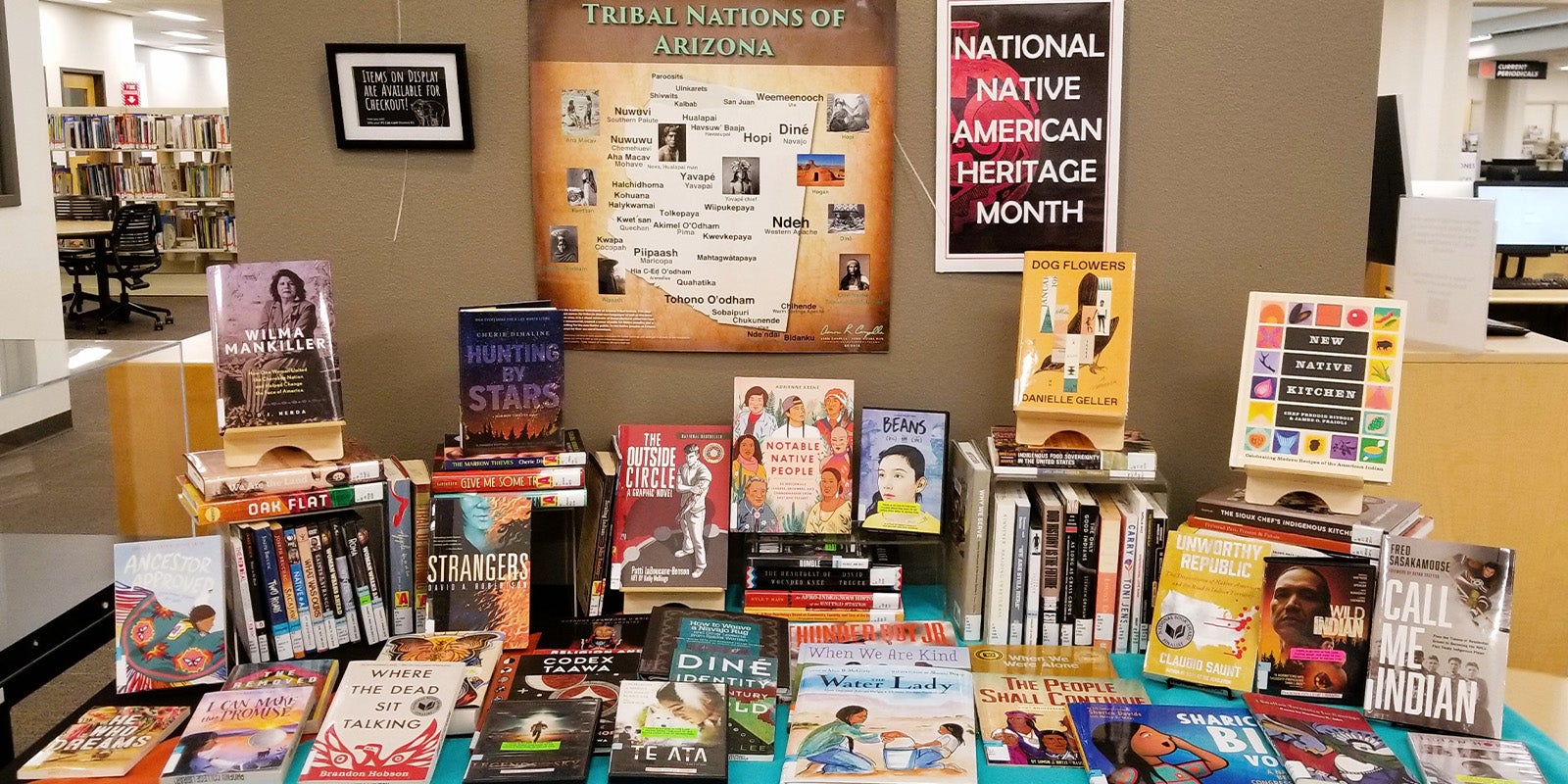Celebrate Native American Heritage Month at Phoenix College
Honor Native American Heritage Month at Phoenix College
Native American Heritage Month recognizes the rich tapestry of cultures and traditions among Indigenous people. Beyond promoting diversity and inclusivity, the occasion emphasizes the value of different perspectives and worldviews. It also allows for reflection on the historical injustices faced by Native American communities during colonization—an essential step in the pursuit of justice.
Phoenix College provides a platform to educate the public about the history, culture, and contributions of Native Americans. This fall, set a positive example for future generations: show them the importance of inclusivity, respect, and truthful dialogue.

As a college, we value the opportunity to share in the beauty of lands that've meant so much to so many.
Maricopa County is home to the following tribes:
Fort McDowell Yavapai Nation
Gila River Indian Community
Salt River Pima-Maricopa Indian Community
Tohno O'odham Nation
Historical Context
 HISTORICAL CONTEXT
HISTORICAL CONTEXT
Tribal Nations
Arizona is home to 22 federally recognized tribal nations.
21 are members of the Inter-Tribal Council of Arizona.
Since 1150 AD, the oldest continually occupied village in the United States is a Hopi settlement called Oraibi. The Hopi, one of the oldest living cultures, were settled in northeastern Arizona, and their reservation is surrounded entirely by the Navajo reservation.
[image: AZ tribal map]
Courtesy Southwest Indigenous Women's coalition swiwc.org

Phoenix Indian Industrial School
In 1830, the Indian Removal Act, signed into law by President Andrew Jackson, displaced thousands of Native Americans from their home onto unsettled lands west of the Mississippi.
In Arizona, the Phoenix Indian Industrial School was established in 1891 to educate thousands of Native American children, although early operation of the boarding school separated children from their families and forced them to assimilate into a military lifestyle. Students were forbidden to speak their native language, had to cut cultural ties with their tribes, and participate in Victorian dining rituals and gender roles. According to Native American Connections, “Though Native American students experienced difficult situations throughout the school’s history, many students had success here and have become pillars and leaders in our community today.”
[image: Phoenix Indian Industrial School]
Courtesy Billie Jean Baguely Library & Archives, Heard Museum, Phoenix

Phoenix Indian School Visitor Center
Located at the corner of Central Avenue and Indian School Road, and open for 99 years, the school closed in 1990 and the site was transferred from the Bureau of Indian Affairs to the City of Phoenix and turned into Steele Indian School Park. The City of Phoenix saved three of the school’s historic buildings and placed them on the National Register of Historic Places. Native American Connections and Phoenix Indian Center with investment from LISC Phoenix, renovated the former grammar school building into the Phoenix Indian School Visitor Center, which includes a gallery, a commercial kitchen, and flexible meeting spaces, which are available for tours and rentals.
[image: Phoenix Indian School Visitor Center]
Courtesy Native American Connections

Hoop of Learning
Phoenix College's Hoop of Learning opens a door to American Indian High school students, offering a competitive advantage on their journey towards higher education. The program covers tuition, course fees, books, as well as bus passes and cultural activities.

Native American Student Association (NASA)
The NASA Club encourages both Native American and non-native students to join and further connect with their culture and form a community. Activities include community service, club outings, as well as cultural exchange and education. Club meetings are held every Thursdays from 12 -1 pm in the Student Union 117A.
[image: Phoenix College NASA Club]

S’edav Va’aki Museum
formerly Pueblo Grande Museum and Archaeological Park
4619 E. Washington Street, Phoenix | 602-495-0901
The S’edav Va’aki Museum celebrates and acknowledges the history of the Native Americans in Phoenix. Events engage and educate on the past and help connect to the present “through sound preservation practices, engaging educational programs, and thoughtful care and presentation of cultural materials.” Hands-on crafts help the community understand and appreciate archeology and the history of Phoenix’s ancient heritage.
[image: S'edav Va'aki Museum Foundation Logo]

Heard Museum
2301 N. Central Ave, Phoenix | 602-252-8840
With a focus on the Native American tribes in the southwest, the Heard Museum presents the art, culture, and history of Indigenous peoples in the Americas. It contains Native American artwork, traditional and modern, historical antiques, and cultural exhibitions. With various programs and displays, the museum acts as a center for education and understanding Native American heritage. It is a renowned cultural and educational resource that draws visitors eager to learn about the rich past and modern representations of the local Indigenous communities.
[image: Heard Museum]

Dog Flowers
Written by Danielle Geller
Using her training as a librarian and archivist, Geller collects her mother's documents, diaries, and photographs into a single suitcase and begins on a journey of confronting her family's history and the decisions she's been forced to make, a journey that will end at her mother's home: the Navajo reservation. The outcome is a memoir that addresses the struggle of family dysfunction, childhood trauma, chronic alcoholism, and homelessness.
[image: DOG FLOWERS book cover]

Beans
Directed by Tracy Deer
Written by Tracy Deer & Meredith Vuchnich
To protect a Mohawk burial ground from being turned into a golf course, a girl nicknamed Beans emerges from adolescence to engage in the a 78-day armed stand-off between two native communities and government forces known as the 1990 Oka Crisis. See the trailer on YouTube: https://www.youtube.com/watch?v=MIlC3zT1gw4
[image: BEANS film posters, in Spanish and English]
NativeAm2
Suggestions from Fannin Library
Explore works by Indigenous authors, and reflect on current and historical challenges that Native Americans have faced. Review the Digital Display.

Melvin Pastores
Student
A peer support specialist at Phoenix's Native American Wellness and Care Center, Melvin Pastores connects community members to essential support services. As he advances in behavioral health studies at PC, Pastores is looking toward the future.
Learn how Melvin's trajectory of helping others is influencing his career goals, and rekindling his gift for writing.
Contributors
CONTRIBUTORS
Meet the Researchers

After attending the Native American Connections Parade during an Oct. 14 field trip, students in an English 102 - Achieving a College Education (ACE) class researched and compiled much of the information on this page.
Back Row, L to R: Michelle Howell, Hannah Bolden, Israel Chavez, Gael Hernandez, Fermin Flores, Isaac Arango, Jonathan Gonzalez Segura.
Middle Row, L to R: Kevin Banuelos, Vania Araujo, Danela Aguilar, Adriana Berrun Vazquez, Pilar Agredano Becerra, Anahi Calderon, Amy Hernandez.
Front Row, L to R: Britney Campos, Lilieth Canchola Dominguez, Liz Bolden.

